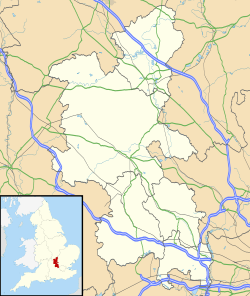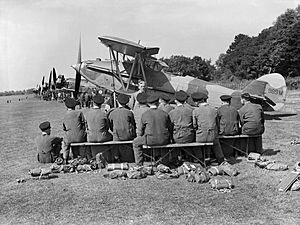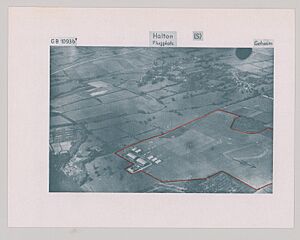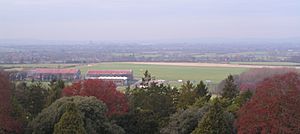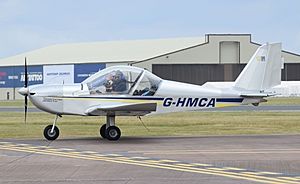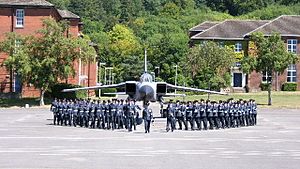RAF Halton facts for kids
Quick facts for kids RAF Halton
|
|||||||||
|---|---|---|---|---|---|---|---|---|---|
| Near Aylesbury, Buckinghamshire in England | |||||||||
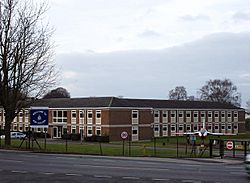
Entrance to RAF Halton
|
|||||||||
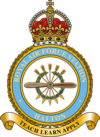
Teach, Learn, Apply
|
|||||||||
|
Shown within Buckinghamshire
|
|||||||||
| Coordinates | 51°47′30″N 000°44′10″W / 51.79167°N 0.73611°W | ||||||||
| Type | Royal Air Force training station | ||||||||
| Area | 297 hectares (730 acres) | ||||||||
| Site information | |||||||||
| Owner | Ministry of Defence | ||||||||
| Operator | Royal Air Force | ||||||||
| Controlled by | No. 22 Group (Training) | ||||||||
| Condition | Operational | ||||||||
| Site history | |||||||||
| Built | 1913 | ||||||||
| In use | 1913–present | ||||||||
| Garrison information | |||||||||
| Current commander |
Wing Commander Peter Seanor | ||||||||
| Occupants |
|
||||||||
| Airfield information | |||||||||
| Identifiers | ICAO: EGWN | ||||||||
| Elevation | 113.38 metres (372 ft) AMSL | ||||||||
|
|||||||||
Royal Air Force Halton, or RAF Halton, is one of the largest Royal Air Force bases in the United Kingdom. It is located near the village of Halton in Buckinghamshire. This site has been used since the First World War. It is planned to close by December 2027.
Contents
History of RAF Halton
The first time military aircraft were used at Halton was in 1913. The owner of the Halton estate, Alfred de Rothschild, invited No. 3 Squadron of the Royal Flying Corps to practice flying there. During the First World War, the British Army used the estate.
In 1916, the Royal Flying Corps moved its air mechanics school to Halton. In 1917, permanent workshops were built for the school by German prisoners of war. After the First World War, the British Government bought the estate for the new Royal Air Force for £112,000.
In 1919, Lord Trenchard started the No. 1 School of Technical Training at RAF Halton. This school trained RAF aircraft apprentices. It stayed at Halton until the early 1990s when it moved to RAF Cosford. Also in 1919, Halton House, a large French-style mansion, became the officers' mess. It is still used for this purpose today.
RAF Halton During World War II
During the Second World War, RAF Halton continued to be a training base. Two squadrons, No. 112 Squadron and No. 402 Squadron of the Royal Canadian Air Force, were based there for part of the war. In June 1943, No. 1448 (Radar Calibration) Flight became No. 529 Squadron at Halton. This squadron used special aircraft called autogyros by the end of the war.
Royal Visits and Training Changes
In July 1952, Queen Elizabeth II performed one of her first duties as Queen at RAF Halton. She presented a special flag, called a 'colour', to the No. 1 School of Technical Training. This was the first time such a flag was given to an apprentice school. It was also the first time it was presented to an 'other rank', Sergeant Apprentice Hines.
In 1993, the No. 1 School of Technical Training moved to RAF Cosford. This created space for the RAF School of Recruit Training to move from RAF Swinderby to RAF Halton. It has been there ever since. Between 2004 and 2005, RAF Halton trained 24,000 people. This included new recruits and Non-Commissioned Officers (NCOs) learning leadership skills.
From 1917 to 1963, a railway line connected Wendover to Halton. This line brought coal and other goods to the base.
The Trenchard Museum at RAF Halton keeps the history of the base and its training programs alive. In 2010, a project by people at the base dug up the training trenches used during the First World War. These trenches are now an educational exhibit.
RAF Hospital Halton
Princess Mary's RAF Hospital Halton opened in 1927. It was a large hospital built specifically for military personnel. Before this, there was a temporary hospital in wooden huts that opened in 1919. This hospital was one of the first in the UK to have a special kidney treatment facility. It also found a cure for a disease called Sandfly fever. In 1940, it was the first hospital in the world to use penicillin widely, soon after it was discovered.
The hospital closed in 1995 because of government defense cuts. The buildings were empty until 2008. They were then taken down to build new homes in an area called Princess Mary Gate.
Airfield Activities
The base has a grass airfield. It is mainly used by gliders, light aircraft, microlights, and the RAF hot air balloon. This airfield is home to several flying clubs. These include the Royal Air Force Gliding & Soaring Association, Chilterns Gliding Centre, The Halton Aero Club, and the RAF Halton Microlight Club.
The airfield was also used as a filming location for a German airfield in the movie Wonder Woman.
Units Based at RAF Halton
Here are some of the main units based at RAF Halton:
Royal Air Force Units
- No. 22 Group (Training) RAF
- The Aviator Training Academy (AvTA): This academy has two squadrons.
- Recruit Training Squadron: This squadron provides basic training for all new non-commissioned people joining the RAF.
- Aviator Command Squadron: This squadron trains non-commissioned officers in leadership and management.
- International Defence Training (RAF)
- Joint Service Adventurous Training (JSAT): This group helps with adventure training.
- RAF Sports Board
- Central Training School: This school figures out what training is needed for RAF ground jobs.
- The Aviator Training Academy (AvTA): This academy has two squadrons.
- Air Training Corps
- Central and East Region
- Hertfordshire & Buckinghamshire Wing Headquarters
- Central and East Region
- No. 38 Group (Air Combat Service Support) RAF
- No. 7644 (VR) Public Relations Squadron (Royal Auxiliary Air Force)
- RAF Voluntary Bands Association
- RAF Halton Voluntary Concert Band
- RAF Pipe Bands Association
- RAF Halton Pipes and Drums Band
Joint Forces Command Units
- Directorate of Joint Warfare
- Joint Information Activities Group (JIAG)
Civilian Units
- Specialist Training School (STS)
- RAF Gliding & Soaring Association
- Chilterns Gliding Centre
- RAF Halton Aero Club: This club has several small planes.
- RAF Halton Microlight Club
Future Plans for RAF Halton
In November 2016, the Defence Secretary announced that the RAF Halton airfield would no longer be part of the Ministry of Defence (MoD) estate. It was planned to be sold by 2022. The next month, a letter confirmed the steps for closing the site:
- Phase 1: The airfield would be sold.
- Phase 2: The School of Recruit Training and Airmen's Command School would move to RAF College Cranwell.
- Phase 3: Other units based there would move or be reorganized.
In February 2019, after a review, it was announced that RAF Halton would not close until at least 2025. Letters sent to local residents in May 2019 confirmed that the phased closure would start in 2022. The full closure was expected by 2025. This date was later moved to 2027 for the airfield.
Buckinghamshire Council has agreed on a plan for RAF Halton. This plan will help guide how the land is used and developed once it stops being a military base in 2027.
See also
- List of Royal Air Force stations
 | Precious Adams |
 | Lauren Anderson |
 | Janet Collins |


